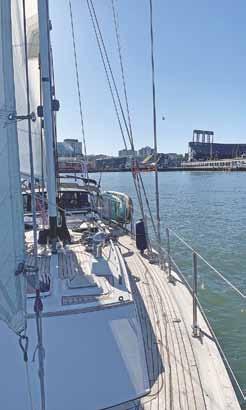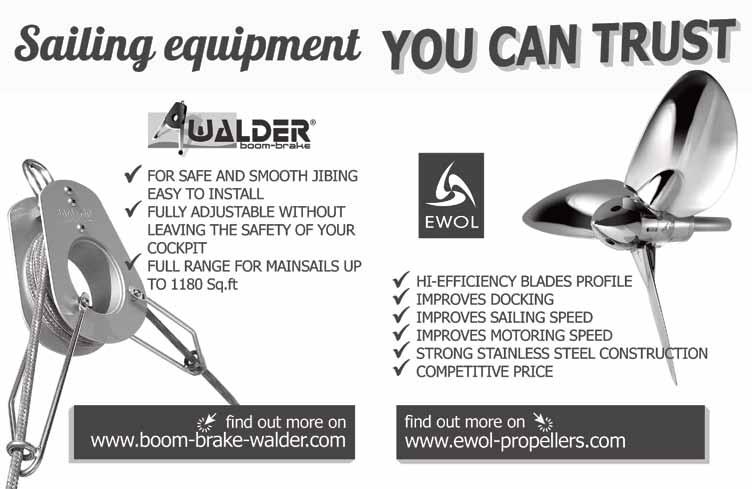
8 minute read
cruising on san francisco bay
As COVID-19 has thrown a wrench into many people's sailing plans, sailors have found themselves stuck at the dock and postponing travel. Many places worldwide have shut down access to entire harbors, leaving people unable to even visit their boats. For my partner Jack and I, sailing has been the only thing that hasn't been canceled because of COVID. As full-time liveaboards, we spent the stay-at-home period hunkered down on board, tackling projects and anchoring out. We've been extremely lucky to be able to sail our boat here on San Francisco Bay, as there have not been any restrictions on recreational boating. Continuing our life aboard has been key to staying safe and sane during these diffi cult times, and it has also given us a chance to act as cruisers in our own backyard. Jack and I run our own marine repair and maintenance business, Spirit Marine Services. The marine industry has boomed during the pandemic, so we've been blessed with plenty of work to keep food on the table. One of the perks of running our own business is being able to make our own schedule. In the past year, we have molded our work around our sailing plans, anchoring throughout the Bay and commuting by dinghy to client boats nearby. Not only do we feel safer avoiding marina offi ces and transiting dock gates, but we also have a much more scenic commute going by water. We have enjoyed being able to sail from anchorage to anchorage, changing our backyard views while still having the comforts of home. When we began sharing our anchorage-hopping stories with others on social media, we realized that most San Francisco Bay sailors expect to return to their slips after a day of sailing. San Francisco may be a spectacular sailing venue, but it is not known for its anchorages. However, this is an unfortunate misconception, and we have made it our mission to share some of the anchorages we have been frequenting and enjoying here on the Bay. After all, there's no better feeling than waking up on the hook and taking in the sights and sounds of your surroundings. Our boat is berthed in Emeryville Marina, so the easiest anchorage for us is Clipper Cove on Treasure Island. That is, as long as the tide is high enough for us to get in through the shallow entrance! Clipper Cove is not regularly dredged and can be impassable at low tide, so check your tide chart before you make the trip! It's a 30-minute motor upwind from our marina and is, without doubt, the calmest spot on the Bay. When entering the cove, stick to the starboard side, hugging close to the pier to avoid the shallow sand bar that protrudes along the northern entrance of the cove. Once past the shoal and heading toward the beach, Clipper Cove is about 15 feet deep throughout most of the anchorage, all the way up to the beach. The tall trees onshore provide perfect protection from prevailing westerly winds, and in the summer, temperatures are warm enough to take a quick dip in the water. We love to paddleboard along the beach, spotting leopard sharks and bat rays gliding through the shallows, and watch blue herons perching on shoreline trees. For the past six years of living aboard, Clipper Cove has been our most frequented refuge, feeling like we are miles away from civilization even though we are just 30 minutes away from
our slip. Anchorage permits are required through the Treasure Island Development Authority (TIDA) — you can do this online at https://sftreasureisland.org/cove/ shortterm. You might also want to check for updates on facilities that are available, as these have changed since COVID. Go to https://sftreasureisland.org/article/ COVID19. Unfortunately, this quiet anchorage is now seeing the effects of the development happening on Treasure Island, which can make for noisy mornings when construction is underway. Venturing out farther on the Bay is a well-known anchorage destination: San Francisco's Aquatic Park Cove. Tucked in close to the bustling city at the heart of Fisherman's Wharf, it's the best of both worlds: stunning San Francisco views while still feeling immersed in nature. The National Park Service now requires an overnight permit, which can be paid for online at https://www.recreation.gov/camping/campgrounds/273757. Note that only non-motorized boats and sailing/auxiliary boats are allowed. This spot is best on calm days, as it can get a bit bouncy when the wind and current are both ripping. As you enter the cove, be very cautious of the Dolphin Club open-water swimmers who frequent this space at all hours of the day (and night). We like to have a lookout watching for swimmers on the bow, even after we've anchored. We once had a guy almost swim directly into our stern! Luckily, he heard our shouting just in time to look up. You can row a dinghy to shore and beach it on the south end of the beach, walk down Fisherman's Wharf and grab some warm chowder or a sweet Ghirardelli treat. We often anchor here and dinghy over to client boats in the San Francisco Small Craft Harbor by St. Francis Yacht Club, making for a scenic and traffi c-free commute. It's a great place to stop for lunch or a quick overnight if you have plans of sailing in the Bay — just raise the sails and you'll be reaching across the slot toward Tiburon or Angel Island in a matter of minutes. Heading across the Bay, tack upwind toward the Golden Gate Bridge, pointing for the North Tower. There you will fi nd the most scenic anchorage around: Horseshoe Cove. This tiny gem is tucked in just past the breakwater for Travis Marina, with the glorious Golden Gate Bridge towering above. It is a very small anchorage, with only room enough for about three boats, and the overall depth is 8-10 feet. Luckily, we've never found it too crowded to anchor — in fact, we spent our Christmas holidays there and had the most stunning views all to ourselves. The Coast Guard station is on the west side of the cove, causing occasional traffi c in and out of the breakwater, so we tend to anchor on the eastern end, closer to Travis Marina. Once you set your hook, settle in and take in the spectacular sights of the Golden Gate. You will understand why it is worth the upwind slog to get there. Presidio Yacht Club is located right onshore, and before COVID,
SONYA DAVID

Sonya, Jack and 'Gemini' off to the next Bay destination.
GEMINI
Anchored in Horseshoe Bay by the Presidio Yacht Club.
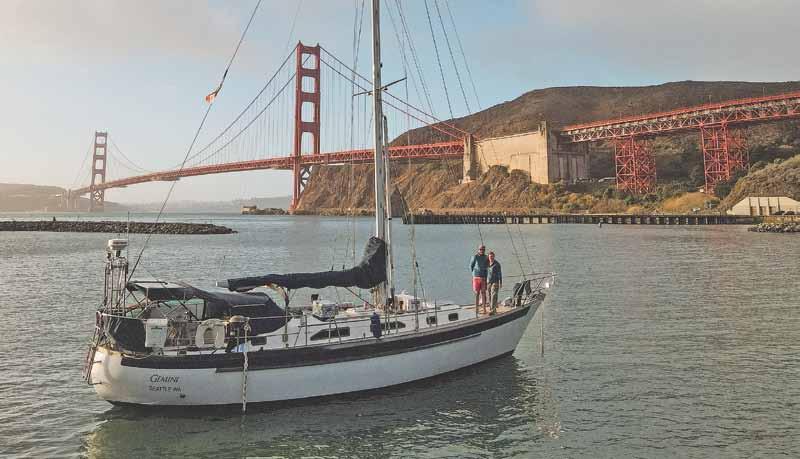
they would host live music almost every week. Check their website to see if they have music or events planned during your stay. If you are longing to stretch your legs, you can go ashore and hike up into the eucalyptus groves near the Cavallo Point Lodge. Horseshoe Cove is also a great spot for early departures to get a jump-start on your offshore adventures, as you can raise the hook and be on the Pacifi c Ocean before the coffee water has fi nished boiling. Angel Island State Park is probably the most well-known spot for overnight Bay adventures. Most people go to the mooring fi eld at Ayala Cove, on the northern side of the island. This cove provides protection from prevailing winds and some relief from the currents that rip through Raccoon Strait. There are a handful of slips available during daylight hours for a mere $15, but if you plan to stay overnight, you must grab a mooring for $30 (you can pay at the ranger station near the docks). It's an idyllic place to head to shore and hike to the top of the island, or snag a slip for a quick lunch while getting a break from the blustery Bay. If you desire to anchor, you can do so in the next cove heading east along the north end of the island. This anchorage has many names: China Cove, Immigration Station and Winslow Cove, among others. We have anchored there a handful of times with little drama, but we've
Left: The view from above Ayala Cove on Angel Island. Worth a stop and a hike. Center: Jack, Sonya and 'Gemini' strut their stuff across San Francisco Bay. Left: Jack ferries the cat aboard the SUP in Clipper Cove.
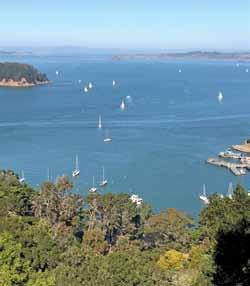

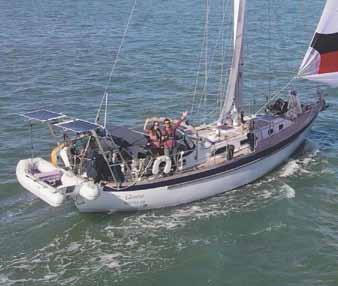

ALL PHOTOS GEMINI EXCEPT WHERE NOTED
to enjoy our time in isolation, discovering new hobbies and adjusting work routines. For us, it has given us the fl exibility to spend more time at anchor and many days sailing our boat. The more time we spend fl oating from anchorage to anchorage, the more we refi ne our "cruisers on San Francisco Bay" title, upgrading our vessel to better serve as a mobile home. There are many more anchorages left to be explored — next on our list are China Camp and Paradise Cove. We hope to inspire others to head out and set the hook in one of these many unique anchorages, making San Francisco Bay more than just a spectacular sailing venue, but also a cruising destination.
— sonya david


A calm and peaceful morning in Clipper Cove off Yerba Buena Island. Sailing out of McCovey Cove.
